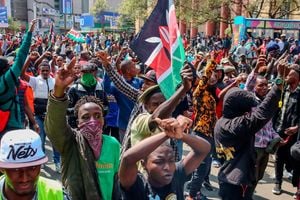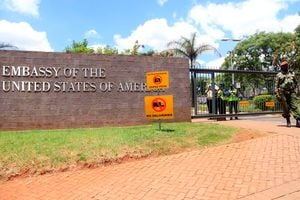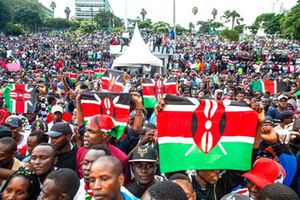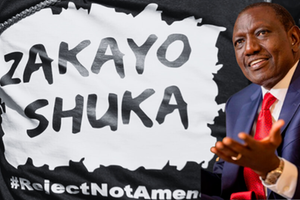
Shakira Wafula, a prominent figure in the June 2024 Gen Z protests, shared her experience of being at the forefront of the nationwide movement against the Finance Bill 2024.
On June 18, 2024, the streets of Nairobi erupted as young Kenyans, electrified by frustration and fuelled by a relentless pursuit of justice, took a bold stand against the controversial Finance Bill.
What began as a reaction to rising taxes and worsening economic conditions quickly grew into a nationwide movement demanding accountability, equality and a voice for the youth.
Among the determined faces was a Gen Z protester who became a symbol of resistance - seen raising her hand, flag in hand, unmoved by heavily armed officers - embodying the courage and defiance of a generation unwilling to accept the status quo. "I am here for Kenya, I am here for my people. I am here for your rights," she said.
In this interview, Shakira Wafula, who was at the forefront of the Gen-Z protests, shares her experience - one of sacrifice, resilience and an unshakable belief in the power of collective action.
What inspired you to join the protests?
The main force behind my decision was the growing frustration with the state of the economy and the lack of opportunities for young people like me. The cost of living was rising and it felt as if the government was indifferent to the struggles of ordinary citizens. It was clear that the government was not serving the people. I couldn't stand by and watch. The protests were a way for me to express my anger and disappointment.
I also felt that the youth were being left out of the political conversation.
Many of us are educated, but we can't find jobs. It was a collective effort, but it was also about my own sense of justice and the need to make my voice heard.
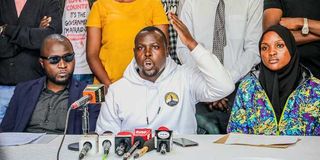
Missing Voices Network member Odhiambo Giro (centre) flanked by Kikao chairperson Lavani Mila and Kikao vice-chair Shakira Wafula during a press briefing at YWCA, Nairobi on Friday. They promised to hold protests in all counties starting December 30, 2024, until all those missing are found.
How has your life changed since the protests?
Since I joined the protests, my life has changed completely. It's like stepping into a different world where you can't live as you used to. At first, I was excited to stand up for what I believed in, but I soon realised that there would be serious consequences. My life became more public and I couldn't go about my daily activities without being noticed.
I even had to change my daily routine. At one point, I stayed in an Airbnb for a while to avoid being targeted. The government had made it clear that it was prepared to use violence to suppress dissent, and that fear was very real. But despite the challenges, I became more involved in activism. I began to network with human rights organisations and other activists. I realised that it wasn't just about one protest - it was about an ongoing struggle for justice.
Do you have any regrets or would you do anything differently?
Looking back, I have no regrets about taking part in the protests.
In fact, I think it was one of the best decisions I've ever made. However, I wish we had been better organised. The protests were powerful, but at times they felt chaotic and disjointed. If we had better leadership and clearer goals, I think we could have achieved more. We lacked a unified strategy and that made it harder to maintain momentum.
There were times when I was frustrated with the direction things were going, especially when there was no clear outcome. We were protesting, but the government didn't seem to be listening. The lack of communication from our leaders also added to the confusion. Sometimes the most important thing is just to show up and be part of the movement.
How did you deal with the fear and anxiety during the protests?
At the beginning I was scared. The government's response to the protests was violent and people were being kidnapped, beaten and even killed. It was a very stressful time. But I also realised that I couldn't let the fear control me.
What helped me deal with the fear was the support of other protesters and human rights organisations. We looked out for each other, and knowing that I wasn't alone gave me strength. Over time, I also began to seek therapy to help me cope with the emotional toll. It wasn't easy.
What was the defining moment in your life that made you stand up and join the protests?
The defining moment for me was when the government passed the Finance Bill. This bill, with its increased taxes and lack of consideration for the people, was the last straw. I'd been watching the political landscape for a long time and I realised that the government wasn't going to change unless we made our voices heard. The viral video I was part of, sharing my frustration, was a pivotal moment. It wasn't just about me anymore - it was about the collective anger of the people.
That moment cemented my commitment to the cause. I realised that my voice mattered and that by joining the protests I was contributing to a larger movement for justice.
Did the protests affect you emotionally?
The anger and frustration were constant, but there was also a deep sense of sadness. The government's response to the protests was brutal and many innocent people were injured or killed. I couldn't help but feel the weight of that, especially when I saw young people like myself being targeted. It was hard to watch and it affected me deeply.
There were also moments of guilt. I wondered if I was doing enough, or if I was putting myself and others at risk for a cause that might not lead to change. The emotional healing process is still ongoing, but I'm learning to deal with the pain.
Did you ever think about giving up?
There were times when it felt like the protests weren't making a difference and the government's response was getting harsher. It was easy to feel defeated, especially when it seemed like we were up against a powerful and unyielding system. But in those moments, I remembered why I joined in the first place.

